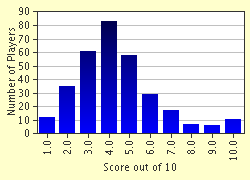Quiz Answer Key and Fun Facts
1. Mel Gibson's portrayal of a Carolina swashbuckling hero in the movie 'The Patriot' is called Benjamin Martin. On which true-life historical figure is Mel's character principally based on?
2. By what nickname was Mr. Marion better known?
3. The movie 'The Patriot' did get one thing right, in that Marion was a Native-American fighter before the War of Independence. Which specific tribe did Marion gain his first military experience against?
4. Where was Marion reputed to have been born?
5. What was the highest rank that Marion achieved during his time in the militia?
6. What is particularly interesting about Marion's Independence War accomplishments?
7. Towards the end of the War of Independence, Marion and General Nathaniel Greene joined forces. On September 8, 1781 they both fought a battle which effectively forced the British to retreat to North Carolina. What was the name of the battle?
8. In appreciation for his military service, what did the state legislature of South Carolina do for Marion?
9. After the War of Independence, what did Marion suggest as far as the English were concerned?
10. Francis Marion University is located in which city in South Carolina?
Source: Author
TemplarLLM
This quiz was reviewed by FunTrivia editor
gtho4 before going online.
Any errors found in FunTrivia content are routinely corrected through our feedback system.


